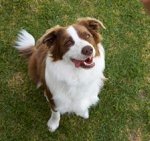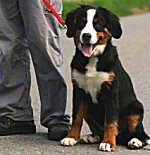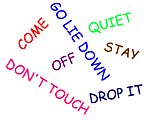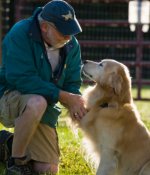Appenzeller Sennenhund (Mountain Dog): What's Good About 'Em, What's Bad About 'Em
Appenzeller Mountain Dog temperament, personality, training, behavior, pros and cons, advice, and information, by Michele Welton, Dog Trainer, Behavioral Consultant, Author of 15 Dog Books
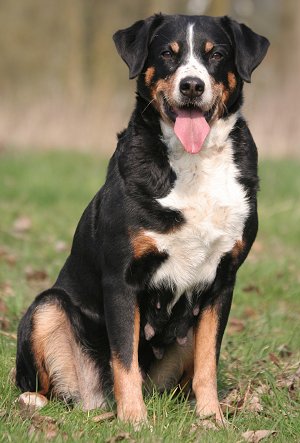
Variously known as the Appenzeller Mountain Dog or Appenzeller Sennenhund, this bold and athletic breed enjoys romping and roughhousing, especially in the snow!
This rugged and intelligent breed likes to keep busy and needs to have something to do. He is not an apartment dog. Pulling a cart or sled, herding, agility, fetching balls, playing Frisbee, and weight pulling are productive outlets for his energy.
Appenzeller Mountain Dogs bond closely with their family and seek lots of attention. Their determination to jump up into your face or shove their body against your leg can be disconcerting to those who are not accustomed to an enthusiastic, vigorous dog. He likes children, but is likely to bowl over little ones.
Appenzellers make vigilant watchdogs and will sound off in a loud, deep voice to announce visitors - or simply to let you know that your neighbor has stepped outdoors.
Though polite with guests, the Appenzeller is the wariest of the Swiss mountain dog breeds. Early and ongoing socialization is essential to develop his stable, self-assured temperament.
The Appenzeller Sennenhund can be dominant and pushy. These are necessary traits for a dog who must control unruly cattle, but challenging for nonassertive owners to handle. During adolescence, the Appenzell's hormones will kick in and he will start to test his limits.
Thus, obedience training should start very early. Heeling is an especially important lesson, for these powerful dogs can literally pull you off your feet.
If you want a dog who...
- Is medium to large, powerful and athletic
- Has a short easy-care coat in a striking color pattern
- Thrives on vigorous athletic activities and exercise
- Has a steady, dependable temperament
- Makes a vigilant watchdog
An Appenzeller Mountain Dog may be right for you.
If you don't want to deal with...
- Vigorous exercise requirements
- Rowdiness and exuberant jumping, especially when young
- Destructiveness when bored or not exercised enough
- Suspiciousness toward strangers
- Strong-willed mind of his own, requiring a confident owner who can take charge
- Chasing and nipping at things that move: children, joggers, other animals, bikes, cars
- Barking
- Waiting lists (very hard to find) and a high price tag
An Appenzeller Mountain Dog may not be right for you.
 |
Dog Breed Traits – Which Traits Are Right For You? In this brand new series, I'll help you decide which dog breed traits would best suit you and your family, your home and yard, and your lifestyle, so you can choose the best dog breed for your family. |
Keep in mind that the inheritance of temperament is less predictable than the inheritance of physical traits such as size or shedding. Temperament and behavior are also shaped by raising and training.
FREE eBooks by Michele Welton
![]() "Respect Training for Puppies" and "Teach Your Dog 100 English Words" are free step by step guides to teaching your pup to be calm and well-behaved.
"Respect Training for Puppies" and "Teach Your Dog 100 English Words" are free step by step guides to teaching your pup to be calm and well-behaved.
![]() "11 Things You Must Do Right To Keep Your Dog Healthy and Happy" is a free guide to keeping your dog mentally, physically, and emotionally happy and healthy so you can enjoy a longer lifetime of companionship.
"11 Things You Must Do Right To Keep Your Dog Healthy and Happy" is a free guide to keeping your dog mentally, physically, and emotionally happy and healthy so you can enjoy a longer lifetime of companionship.

- You can avoid some negative traits by choosing an ADULT dog from an animal shelter or rescue group. With an adult dog, you can easily see what you're getting, and plenty of adult Appenzellers have already proven themselves not to have negative characteristics.
- If you want a puppy, you can avoid some negative traits by choosing the right breeder and the right puppy.
More traits and characteristics of the Appenzeller
If I was considering an Appenzeller Mountain Dog, I would be most concerned about...
- Providing enough exercise and mental stimulation. Appenzeller Sennenhunds are working dogs. They need regular opportunities to vent their energy and do interesting things. Otherwise they will become rambunctious and bored – which they usually express by barking and destructive chewing. Bored Appenzellers can destroy your home in a single day.
I do not recommend this breed if you don't have the time or inclination to take your dog hiking or swimming or to the dog park, or to get involved in herding, or weight-pulling, or carting, or tracking, or agility (obstacle course), or advanced obedience, or a similar canine activity. Appenzellers were never intended to be simply household pets.
- Providing enough socialization. Many Appenzeller Mountain Dogs have protective instincts toward strangers. They need extensive exposure to friendly people so they learn to recognize the normal behaviors of "good guys." Then they can recognize the difference when someone acts abnormally. Without careful socialization, they may be overly suspicious or cautious of everyone.
- Bounciness. If you have small children, or if you or anyone who lives with you is elderly or infirm, I do not recommend Appenzeller Sennenhund puppies. Young Appenzellers (up to about two years old) can be bulls in a china shop. When they romp and jump, they do so with great vigor, and things can go flying, including people. The temptation to play roughly and nip at moving people is simply too strong in many young Appenzellers.
- The strong temperament. Appenzeller Mountain Dogs are versatile working dogs, capable of learning a great deal, but they have an independent mind of their own and are not pushovers to raise and train. Some are willful, obstinate, and dominant (they want to be the boss) and will make you prove that you can make them do things. You must show them that you mean what you say. To teach your Appenzeller to listen to you, "Respect Training" is mandatory. Read my free online training programs.
- Barking. With their farm guardian heritage, Appenzeller Mountain Dogs are often quick to sound the alarm – with a deep booming bark – at every new sight and sound. You have to be equally quick to stop them so it doesn't become a bad habit.
- Finding one and paying the price. This breed is very rare in the United States and breeders are charging a small fortune for them.
My best-selling books – now available FREE on my website
 Respect Training For Puppies: 30 seconds to a calm, polite, well-behaved puppy is for puppies 2 to 18 months old. Your puppy will learn the 21 skills that all family dogs need to know. Click here to read for free.
Respect Training For Puppies: 30 seconds to a calm, polite, well-behaved puppy is for puppies 2 to 18 months old. Your puppy will learn the 21 skills that all family dogs need to know. Click here to read for free. Teach Your Dog 100 English Words is a unique Vocabulary and Respect Training Program that will teach your adult dog to listen to you and do what you say. Click here to read for free.
Teach Your Dog 100 English Words is a unique Vocabulary and Respect Training Program that will teach your adult dog to listen to you and do what you say. Click here to read for free. 11 Things You Must Do Right To Keep Your Dog Healthy and Happy helps your dog live a longer, healthier life. Get my honest advice about all 11 Things before you bring home your new puppy, because some mistakes with early health care cannot be undone. Click here to read for free.
11 Things You Must Do Right To Keep Your Dog Healthy and Happy helps your dog live a longer, healthier life. Get my honest advice about all 11 Things before you bring home your new puppy, because some mistakes with early health care cannot be undone. Click here to read for free.Related posts you might enjoy



